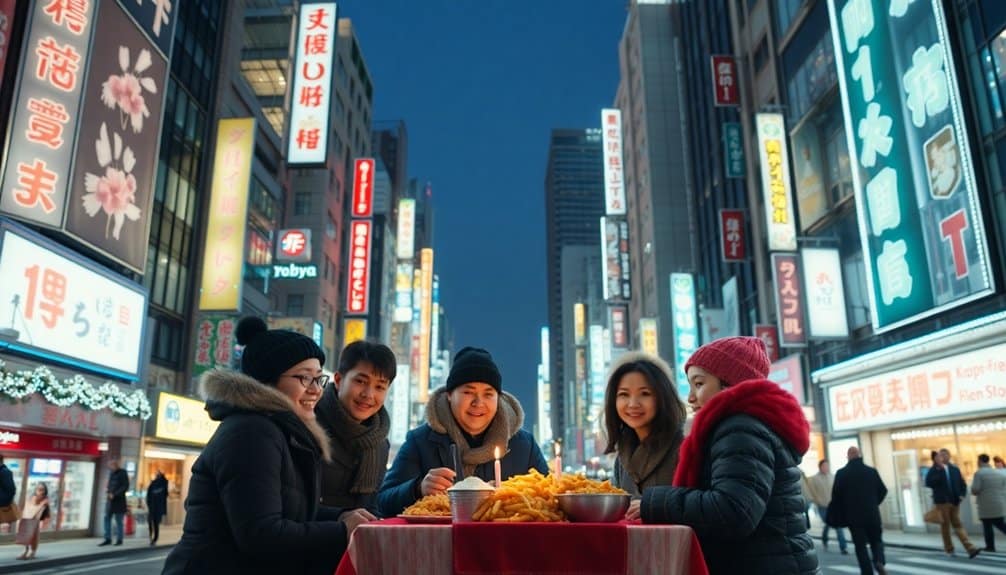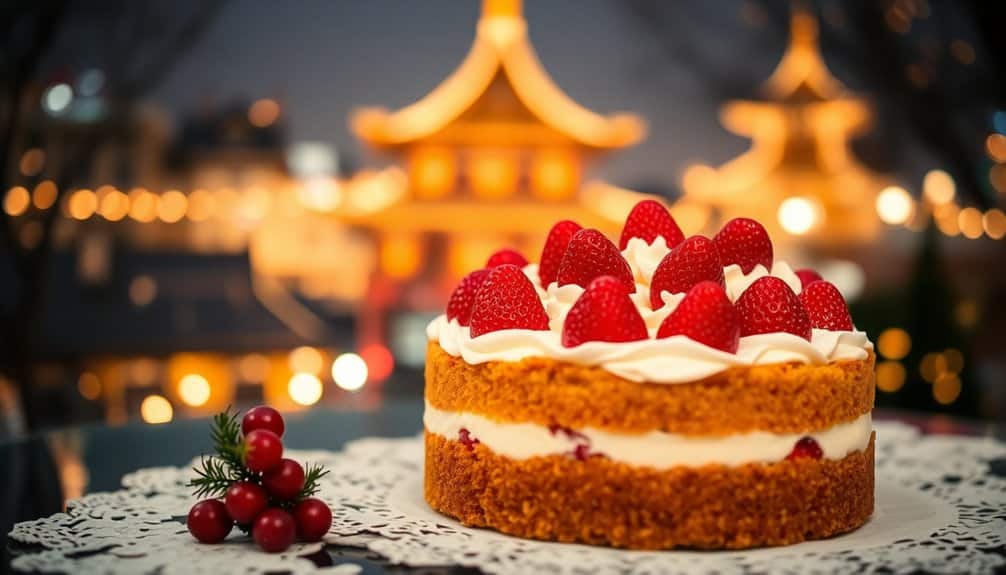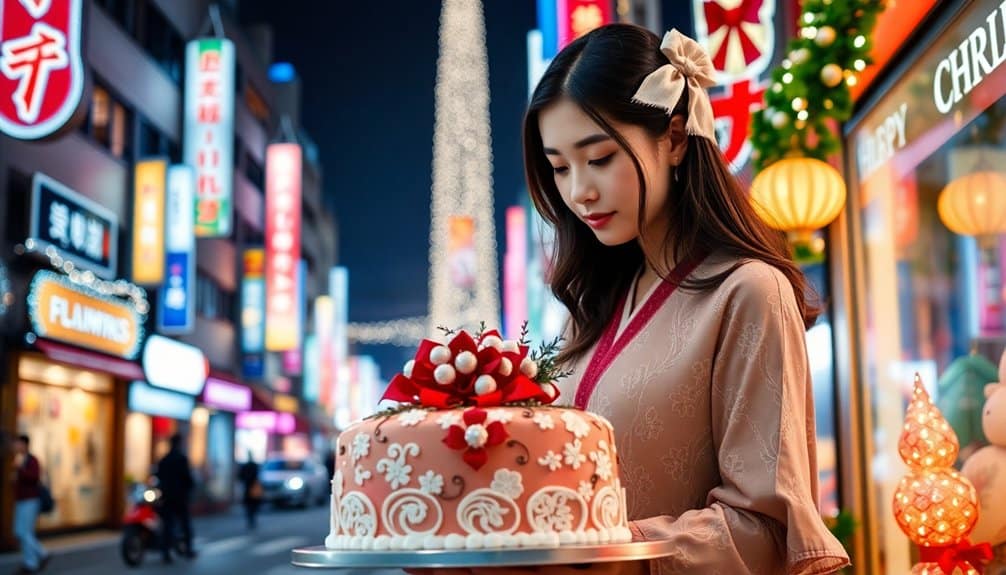Japan’s Christmas celebrations blend Western and local customs, featuring unique practices like KFC feasts and strawberry shortcake.
As a non-Christian majority country, Christmas has become a commercial event.
This adaptability raises questions about the holiday’s cultural significance and its distinctive customs.
Table of Contents
Toggle
Christmas in Japan is a holiday that blends Western customs with local culture, resulting in a unique celebration. With only about 1% of the population identifying as Christian, the focus is on holiday shopping and secular celebrations. In major cities like Tokyo, the streets transform into winter wonderlands, filled with markets and illuminations that attract both locals and tourists. The holiday shopping experience is a significant aspect of Japanese Christmas, with stores offering a wide range of promotions and discounts. This commercial celebration is a distinct departure from the holiday’s religious origins, embracing the freedom of expression that comes with festive activities. As someone who values the delicate balance of traditional Japanese beauty care, I appreciate the way Japanese Christmas strikes a balance between embracing Western influences and maintaining local charm. In the midst of all the festivities, the soft glow of illuminations and the gentle chatter of crowds create a serene atmosphere, much like the peaceful sound of the uguisu, or Japanese nightingale, which is often associated with the arrival of spring, but can also be appreciated during the winter season. The Japanese Christmas experience is a fascinating blend of cultures, resulting in a vibrant and captivating celebration that is quintessentially Japanese.
Japan’s festive food traditions are a fascinating blend of old and new, with one unlikely player taking center stage: Kentucky Fried Chicken, or KFC. The brand’s successful integration into Japanese holiday meals can be traced back to its strategic marketing efforts.
| Year | Sales | Marketing Strategy |
|---|---|---|
| 1970 | Low | Concept initiation |
| 1974 | Medium | Kurisumasu campaign |
| 1980 | High | Expanded marketing |
| 1990 | Higher | Increased advertising |
| 2000 | Highest | Digital marketing |
The numbers speak for themselves, showing a steady increase in sales over the years, from the initial concept in 1970 to the peak in 2000 with digital marketing. This progression underscores the impact of tailored marketing strategies on consumer behavior, making KFC a staple in many Japanese households during Christmas. In Japan, where tradition and innovation coexist, the adoption of KFC as a Christmas tradition highlights the flexibility and openness of the culture to new customs, especially when it comes to food – an essential part of any celebration. The success of KFC in Japan demonstrates how effective marketing can introduce and cement new traditions, providing consumers with a broader range of choices for their festive meals.

In Japan, Christmas cake customs have a unique twist, with strawberry shortcake being a popular dessert during the holiday season. This tradition is rooted in the country’s post-WWII recovery, when American influence introduced Western-style sweets as a symbol of wealth and prosperity. The cake’s design often features festive and patriotic elements, such as colors reminiscent of the national flag.
The significance of strawberry shortcake in Japanese Christmas celebrations can be attributed to the country’s history and cultural exchange. As Japan underwent economic growth and development, Western-style desserts became a status symbol, representing a family’s wealth and prosperity. The tradition of serving strawberry shortcake during Christmas has since been passed down, with many Japanese households enjoying this sweet treat as part of their holiday festivities.
Strawberry shortcake’s enduring popularity in Japan is also due to its aesthetic appeal, with intricate designs and presentations that reflect the country’s attention to detail and love for beauty. As someone familiar with traditional Japanese beauty care and the art of *uguisu no fun*, I appreciate the delicate balance of flavors and textures that make strawberry shortcake a beloved Christmas treat in Japan.
As the festive season unfolds, romantic evenings take center stage, with December 24th emerging as a day synonymous with love and joy in Japan. This special night is a time for couples to come together, enjoying romantic dinners and taking part in various seasonal events that fill the air with magic.
| Events | Description |
|---|---|
| Illuminations | Delicate city lights that dance across the sky |
| Dinners | Exquisite, fancy meals crafted to delight the senses |
| Strolls | Leisurely evening walks under the starry night sky |
| Music | Soft, romantic songs that whisper sweet nothings to the heart |
The essence of Christmas Eve in Japan lies in its ability to bring people together, fostering an atmosphere of love and joy. With so many wonderful events and activities to choose from, couples can tailor their evening to perfectly suit their tastes, creating unforgettable memories along the way. This freedom to celebrate as one desires is a cornerstone of the holiday’s charm, making Christmas Eve a truly special and enchanting night in Japan.

Christmas in Japan is a celebration that has taken on a life of its own, driven largely by commercial and social forces rather than religious significance. The commercialization of Christmas is evident in the way it has been adapted to fit Japanese culture, blending Western influences with local customs to create a unique festive atmosphere. This blend is reflected in the country’s Christmas traditions, which prioritize consumer habits and social gatherings over religious practices.
Japan’s Christmas celebrations have become an integral part of the country’s social landscape, attracting both locals and tourists alike. The economic boost from Christmas-related activities is significant, with a notable impact on the food, entertainment, and retail sectors. As societal values and interests continue to evolve, so too do Japan’s Christmas celebrations, reflecting the country’s adaptability and willingness to embrace new ideas and traditions. In fact, the way Christmas is celebrated in Japan is a testament to the country’s ability to take external influences and make them its own, creating a truly unique and fascinating cultural phenomenon.